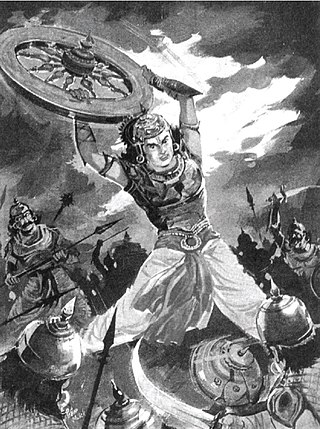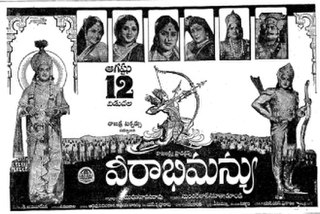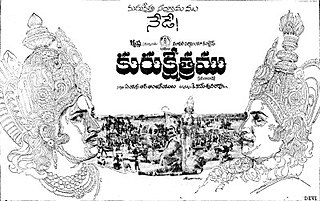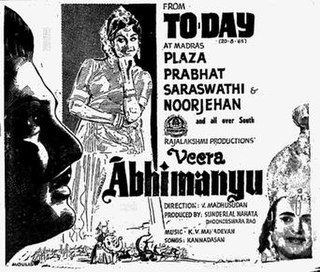Veera Abhimanyu could refer to one of the following films:
- Veera Abhimanyu (1936 film), in Telugu
- Veera Abhimanyu (1965 film), in Tamil
- Veerabhimanyu, 1965 Telugu film
Veera Abhimanyu could refer to one of the following films:

Ghantasala Venkateswararao, known mononymously by his surname as Ghantasala, was an Indian playback singer and film composer known for his works predominantly in Telugu and Kannada cinema and also in Tamil, Malayalam, Tulu and Hindi language films. He is considered one of the greatest singers of Telugu cinema. In 1970, he received the Padma Shri award, India's fourth highest civilian award for his contribution to Indian cinema. According to The Hindu and The Indian Express, Ghantasala was 'such a divine talent and with his songs he could move the hearts of the people'. 'Ghantasala's blending of classical improvisations to the art of light music combined with his virtuosity and sensitivity puts him a class apart, above all others in the field of playback singing'. Gifted with what Indian film historian V. A. K. Ranga Rao called 'the most majestic voice', Ghantasala helped Telugu film music develop its own distinct character which remains unparalleled. He is referred to as the 'Gaana Gandharva' for his mesmerising voice and musical skills.

Daana Veera Soora Karna is a 1977 Indian Telugu-language Hindu mythological film co-written, produced and directed by N. T. Rama Rao under his banner Ramakrishna Cine Studios. Based on the life of Karna from the Mahabharata, the film stars Rama Rao in three roles: the title character Karna, Duryodhana, and Krishna. The music was composed by composed by Pendyala Nageswara Rao.

Abhimanyu is a warrior in the Hindu epic Mahābhārata. He was a young and valiant warrior of the Kuru lineage, born to Arjuna—the third Pandava brother—and Subhadra—the sister of the deities Krishna and Balarama. He was also one of the few individuals, along with his father, who knew the technique to enter the Chakravyuha, a powerful military formation. Abhimanyu was raised by his maternal family in Dvārakā because the Pandavas had been exiled for thirteen years by their cousins, the Kauravas. After his father's return, his marriage was arranged with Uttarā, the princess of the Matsya Kingdom.

Mayabazar is a 1957 Indian epic Hindu mythological film directed by K. V. Reddy. It was produced by Nagi Reddi and Chakrapani under their banner, Vijaya Productions. The film was shot simultaneously in Telugu and Tamil, with a few differences in the cast. The story is an adaptation of the folk tale Sasirekha Parinayam, which is based on the characters of the epic Mahabharata. It revolves around the roles of Krishna and Ghatotkacha, as they try to reunite Arjuna's son Abhimanyu with his love, Balarama's daughter Sasirekha (Savitri). The Telugu version features Gummadi, Mukkamala, Ramana Reddy, and Relangi in supporting roles, with D. Balasubramaniam, R. Balasubramaniam, V. M. Ezhumalai, and K. A. Thangavelu playing those parts in the Tamil version.

Indra is a 2002 Indian Telugu-language action drama film directed by B. Gopal and produced by C. Aswani Dutt under Vyjayanthi Movies banner. The film stars Chiranjeevi, Aarthi Agarwal, and Sonali Bendre while Mukesh Rishi, Sivaji, and Prakash Raj play supporting roles with music composed by Mani Sharma. The film won three state Nandi Awards and two Filmfare Awards South with Chiranjeevi winning both the Nandi Award for Best Actor and Filmfare Award for Best Actor – Telugu.

Arudra was an Indian author, poet, lyricist, translator, publisher, dramatist, playwright, and an expert on Telugu literature. He is also known for his works in Telugu cinema as a lyricist, dialogue writer, and story writer. He received the Sahitya Akademi Award in 1987.
Veera may refer to:

Sasirekha Parinayam is a 2009 Indian Telugu-language romantic drama film directed by Krishna Vamsi and produced by Sunkara Madhumurali. The film stars Tarun and Genelia. The film has been dubbed in Hindi as Bhagam Bhag Love and into Tamil as Sasirekhavin Kalyanam.

Veerabhimanyu is a 1965 Indian Telugu-language Hindu mythological film produced by Sunderlal Nahta and Doondi and directed by V. Madhusudhana Rao. It stars N. T. Rama Rao, Sobhan Babu and Kanchana, with music composed by K. V. Mahadevan. The film was recorded as a Super Hit at the box office. It was simultaneously filmed in Tamil as Veera Abhimanyu, with slightly different cast. The film had its climax scene shot in Eastmancolor. The film is considered a breakthrough for Sobhan Babu.
Surabhi Kamalabai (1913–1977) was an Indian actress who worked in Telugu theatre and Telugu cinema. She has the distinction of being the first Telugu actress in a talkie film with Bhakta Prahlada (1932), directed by H. M. Reddy. She played the role of Leelavathi, the wife of Hiranyakasipa. Since then she acted in about 30 films, including Savitri (1933), Pathala Bhairavi (1951), Malliswari (1951), Illarikam (1959) and Velugu Needalu (1961).

Bejawada or Bezawada is a 2011 Indian Telugu-language action crime film based on the Vijayawada Gang Warfare, directed by Vivek Krishna and produced by Ram Gopal Varma and Renny Johnson. The film stars Naga Chaitanya and Amala Paul. The movie was received negatively at the box office but positively at the television and OTT as it accurately depicted the historical gang war in Vijayawada. Later it was dubbed in Hindi as Hero: The Action Man (2013) and also in Tamil as Vikram Dhadha. It marked Amala’s Telugu debut.
Rajasree, also known as Rajasri or Rajashri, is an Indian actress active from 1956 to 1979. She is particularly famous for her portrayal as a princess in several folklore Telugu movies opposite N. T. Rama Rao and Tadepalli Lakshmi Kanta Rao and for acting alongside Ravichandran in the Tamil comedy films Neeyum Naanum, Kadhalikka Neram Illai and Delhi Mappilai. Notable among Rajasri's roles in non-folklore social films in Tamil are as Nimmi in the Tamil hit comedy film Kaadhalikka Neramillai, remade as Preminchi Choodu in Telugu, as movie star Bhama in Tamil film Bama Vijayam. She was credited as Gracy in the Malayalam movies she starred in her career since her debut film Bharya (1962), directed by Kunchako. Rajasree went on to do 200 films spread across the languages – Telugu, Tamil, Kannada, Malayalam and Hindi from beginning of 1956 to 1979.
SIIMA Award for Best Actor in a Negative Role – Telugu is presented by Vibri media group as part of its annual South Indian International Movie Awards, for the best acting done by an actor in a negative role in Telugu films. The award was first given in 2012 for films released in 2011.

The following is the filmography of Vanisri, the Indian actress who acted in Telugu, Tamil, and Kannada-language films. She acted predominantly in Telugu films. She has appeared in total 200 films among which 147 were in Telugu, 39 in Tamil, 12 in Kannada, and one in Hindi.

Kurukshetram is a 1977 Indian Telugu-language Hindu mythological film directed by Kamalakara Kameswara Rao. The film features an ensemble cast that includes Krishna, Sobhan Babu, Krishnam Raju, Jamuna, and Vijaya Nirmala. It was produced by A. S. R. Anjaneyulu, with Krishna serving as the presenter. The screenplay was written by Samudrala Jr., while the dialogues were penned by Tripuraneni Maharadhi. Notable supporting roles were played by Kaikala Satyanarayana, Anjali Devi, Jayaprada, Gummadi, and Chandra Mohan. The music was composed by Saluri Rajeswara Rao.
Geethanjali was an Indian actress who worked in Telugu, Tamil, Malayalam, and Hindi films. In a career spanning close to six decades, she featured in over 500 films across multiple languages. Her first film as a dancer is Rani Ratnaprabha in 1960. NTR introduced her to the silver screen as a heroine with his directorial debut film Sita Rama Kalyanam in 1961. She was famous for her roles in Murali Krishna (1964), Doctor Chakravarthy (1964), Illalu (1965), Sambarala Rambabu (1970), Kaalam Marindi (1972), and Abbayigaru Ammayigaru (1973). She was also a member of the Nandi Awards committee.

Veera Abhimanyu is a 1965 Indian Tamil-language Hindu mythological film directed by V. Madhusudhana Rao and produced by Sunderlal Nahta and Doondi. Based on Abhimanyu, a character from the Indian epic Mahabharata, the film stars Gemini Ganesan leading an ensemble cast, including A. V. M. Rajan portraying the title character. It was simultaneously filmed in Telugu as Veerabhimanyu, with a largely different cast. The film was released on 20 August 1965, and failed commercially.
Pothina Doondeswara Rao, popularly known as Doondi or Dhoondy, was an Indian film producer and director noted for his work in Telugu cinema. His career spanned from the 1950s to the mid-1970s, during which he produced over 60 films in Telugu, Hindi, Kannada, and Tamil languages. In 2005, Doondi served as the Chairman of the Nandi Awards Committee.
Chandra Sekhar, known professionally as Chatrapathi Sekhar, is an Indian actor who primarily works in Telugu films. He is known for his frequent collaborations with S. S. Rajamouli.
Veera Abhimanyu is a 1936 Indian Telugu-language Hindu mythological film directed by V. D. Ameen and produced under the banner of Select Pictures Circuit. The film stars Pulipati Venkateswarlu, Kanchanamala, and Surabhi Kamalabai. The film was written by Kodavatiganti Kutumba Rao. It was released on 24 October 1936. The film was commercially successful.